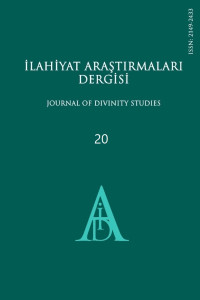Abstract
Bu çalışmada Kur’ân’ın anlaşılmasında gece vaktinin önemi üzerinde durul-muştur. Kur’ân’da bu konuya işaret eden âyetler tespit edilmeye çalışılmış, aka-binde bu âyetler müstakil başlıklar altında ele alınmıştır. Her konu ile ilgili tespit edilen âyetler muhtelif tefsirlerin ışığı altında incelenmiştir. Kur’ân-ı Kerimde gece ibadetine işaret olarak yorumlanan âyetlerin daha geniş bir anlam yelpaze-sine sahip olduğunu düşünüyoruz. Bu âyetlerde işaret edilen hakikatleri müstakil bir ibadet şekli olarak anlamak âyetlerin anlam alanını daraltacağını düşünüyo-ruz. Belki bu ibadeti Kur’ân’ın anlaşılmasına vesile olan namaz, dua, kıraat, tefek-kür ve tedebbür gibi ibadetler mecmuası olarak anlamanın daha yerinde olacağı kanaatindeyiz. Daha önce bu konu ekseninde yapılan çalışmaların ilgili âyetleri gece/teheccüd namazı ile sınırlandırıldıkları görülmektedir. Ancak zikri geçen ifadelerden Kur’ân âyetlerine odaklanmanın daha fazla ön planda tutuğu söyle-nebilir. Kur’ân âyetlerinin anlaşılması için bu vakitlerin özenle seçildiğini düşünü-yoruz. Bu ibadetin sadece bu ümmete özel bir ibadet olmadığını görüyoruz. Bu ibadetin diğer semavî dinleri de kapsayan evrensel bir ilâhî kaide olduğunu düşü-nüyoruz. Hz. Peygamber ve ilk inananlar bu ibadetle zorunlu tutuldukları gibi önceki ümmetlerde de bu ibadetin icra edildiği görülmektedir. Bu vaktin tercih edilmesinde, insanın okuduklarına en üst düzeyde odaklanması ve okuduklarından maksimum düzeyde verim almasının gözetildiğini söylememiz mümkündür. Nite-kim bu vakitlerde manevî ve ruhanî hakikatlerle derinden bir temas sağlanır. Aynı şekilde bu vakti değerlendirmenin bir ilâhî terbiye metodu olduğunu da söyleyebiliriz.
References
- Baş, Erdoğan “Kur’an’ın Zamanın Yarısı Olan Geceye Yüklediği Anlam”, Uluslararası İslam Medeniyetinde Zaman Sempozyumu, ed. Bilal Kuşpınar (41/ 41-51 İstanbul: Bilir Matbaacılık Kâğıt Ürünleri ve Kırtasiye Malzemeleri San. 08-11 Ekim, 2015.
- el-Beyzâvî, Nâsırüddîn Ebû Saîd Abdullah. Envârü’t-tenzîl ve esrârü’t-te’vîl. thk. Muhammed Abdurrahman el-Mer‘aşî. Beyrut: Dâru'l-İhyai’t-Turâsi’l-Arabî,1418/1997.
- Buhârî, Ebû Abdillâh Muhammed b. İsmail. Sahihu’l-buhârî. 6 Cilt. Beyrut: Dâru’l-İbn Kesir, 1408/1987.
- Elbânî, Muhammed Nasreddin, Sahihu’ve’d-Daifû Süneni Tirmizi, İskenderiye: Bernamicu Menzumetu’t-Tahkikatu’l-Hadis, ts.
- el-Gazzâli, Ebû Hamid Muhammed b. Muhammed el-Tusî, İhyaü’ ulûmi’d-din, Beyrut: Dâru’l-Marife, ts.
- İbn Kesir, Ebü’l-Fidâ İsmail. Tefsîrü’l-Kur’âni’l-Azîm, thk. Sami b. Muhammed Selam. y.y.:Dâru’t-Tayyibe li’n-Neşr ve’t-Tavzi,1420/1999.
- Karslı, İbrahim Halil. Kur’ân’ı Anlamaya Giriş. Ankara: DİB Yayınları, 2020.
- el-Merâğî, Ahmed b. Mustafa, Tefsîrü’l-Merâğî, Mısır: Matbaatu Mustafa el-Babî el-Halebî, 1366/1946.
- er-Razî, Ebû Abdullah Hasan b. Hüseyin et-Teymî. Mefatihu’l-gayb, Beyrut: Dâru İhyai't-Türasi’l-Arabî, 1420/1999.
- es-Sâ‘dî, Abdurrahman b. Nasır b. Abdullah, Teysirü'l-Kerimi'r-Rahman fi Tef-siri Kelami'l-Mennan, thk. Abdurrahman b. Mu‘âlâ, y.y.: Müssesetü’l-Risale, 1421/2000.
- eş-Şa‘râvî, Muhammed Mütevellî. Tefsiru’ş-Şa‘râvî. y.y.: Metabi‘ Ehbar el-Yevm, 1418/1997.
- Taberî, Ebû Caʻfer Muhammed b. Cerîr. Câmiu’l-beyân an te’vîli ayî’l-Kur’ân. thk. Ahmed Muhammed Şakir. y.y.: Müessesetü’r-Risâle, 1421/2000.
- Tok, Fatih “Kur’ân’da Geceye Dair Kavramlar ve Eylemler”, Cumhuriyet İlahi-yat Dergisi, 24/1 (Haziran, 2020), 141-165.
- ez-Zemahşerî, Ebû’l-Kâsım el-Hârizmî, el-Keşşaf, Beyrut: Dâru’l-Kütübi’l-Arabiyye, 1407/1986.
Abstract
Abstract: This study focuses on the effect of night time on the understanding of the Quran. The verses in the Quran that point to this issue were tried to be identi-fied, and then these verses were discussed as separate headings. The verses identified regarding each subject were discussed in the light of various commen-taries. We think that the verses interpreted as signs of night worship in the Holy Quran have a wider range of meaning. We think that understanding the truths mentioned in these verses as an independent form of worship narrows the meaning of the verses. Maybe we think it would be more appropriate to under-stand it as a collection of acts of worship such as prayer, supplication, recitation, contemplation and reflection, which are instrumental in understanding the Quran. We see that this night's worship is not a special worship only for this ummah. We see that this worship is a universal divine rule that also includes other heavenly books. Just as the Prophet and the first believers were obliged to perform this worship, it is seen that this worship was also performed in previous ummahs. It is possible to say that choosing this time is effective because people focus on what they read at the highest level and get maximum efficiency. As a matter of fact, a deep contact with spiritual and spiritual truths is achieved during these times. Likewise, we can say that making use of this time is a method of divine discipline. It is seen that previous studies on this subject limited the rele-vant verses to night/tahajjud prayer. However, from the expressions mentioned above, it can be said that focusing on the verses of the Quran is more prominent. We think that these times were carefully chosen to understand the verses of the Quran.
Keywords: Qur’an, recitation night, worship, Prayer.
Keywords
References
- Baş, Erdoğan “Kur’an’ın Zamanın Yarısı Olan Geceye Yüklediği Anlam”, Uluslararası İslam Medeniyetinde Zaman Sempozyumu, ed. Bilal Kuşpınar (41/ 41-51 İstanbul: Bilir Matbaacılık Kâğıt Ürünleri ve Kırtasiye Malzemeleri San. 08-11 Ekim, 2015.
- el-Beyzâvî, Nâsırüddîn Ebû Saîd Abdullah. Envârü’t-tenzîl ve esrârü’t-te’vîl. thk. Muhammed Abdurrahman el-Mer‘aşî. Beyrut: Dâru'l-İhyai’t-Turâsi’l-Arabî,1418/1997.
- Buhârî, Ebû Abdillâh Muhammed b. İsmail. Sahihu’l-buhârî. 6 Cilt. Beyrut: Dâru’l-İbn Kesir, 1408/1987.
- Elbânî, Muhammed Nasreddin, Sahihu’ve’d-Daifû Süneni Tirmizi, İskenderiye: Bernamicu Menzumetu’t-Tahkikatu’l-Hadis, ts.
- el-Gazzâli, Ebû Hamid Muhammed b. Muhammed el-Tusî, İhyaü’ ulûmi’d-din, Beyrut: Dâru’l-Marife, ts.
- İbn Kesir, Ebü’l-Fidâ İsmail. Tefsîrü’l-Kur’âni’l-Azîm, thk. Sami b. Muhammed Selam. y.y.:Dâru’t-Tayyibe li’n-Neşr ve’t-Tavzi,1420/1999.
- Karslı, İbrahim Halil. Kur’ân’ı Anlamaya Giriş. Ankara: DİB Yayınları, 2020.
- el-Merâğî, Ahmed b. Mustafa, Tefsîrü’l-Merâğî, Mısır: Matbaatu Mustafa el-Babî el-Halebî, 1366/1946.
- er-Razî, Ebû Abdullah Hasan b. Hüseyin et-Teymî. Mefatihu’l-gayb, Beyrut: Dâru İhyai't-Türasi’l-Arabî, 1420/1999.
- es-Sâ‘dî, Abdurrahman b. Nasır b. Abdullah, Teysirü'l-Kerimi'r-Rahman fi Tef-siri Kelami'l-Mennan, thk. Abdurrahman b. Mu‘âlâ, y.y.: Müssesetü’l-Risale, 1421/2000.
- eş-Şa‘râvî, Muhammed Mütevellî. Tefsiru’ş-Şa‘râvî. y.y.: Metabi‘ Ehbar el-Yevm, 1418/1997.
- Taberî, Ebû Caʻfer Muhammed b. Cerîr. Câmiu’l-beyân an te’vîli ayî’l-Kur’ân. thk. Ahmed Muhammed Şakir. y.y.: Müessesetü’r-Risâle, 1421/2000.
- Tok, Fatih “Kur’ân’da Geceye Dair Kavramlar ve Eylemler”, Cumhuriyet İlahi-yat Dergisi, 24/1 (Haziran, 2020), 141-165.
- ez-Zemahşerî, Ebû’l-Kâsım el-Hârizmî, el-Keşşaf, Beyrut: Dâru’l-Kütübi’l-Arabiyye, 1407/1986.
Details
| Primary Language | Turkish |
|---|---|
| Subjects | Tafsir |
| Journal Section | Research Articles |
| Authors | |
| Publication Date | December 31, 2023 |
| Submission Date | November 3, 2023 |
| Acceptance Date | December 22, 2023 |
| Published in Issue | Year 2023 Issue: 20 |


